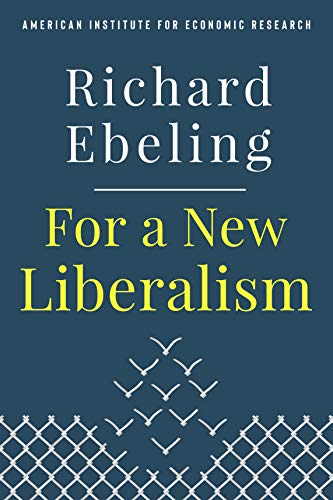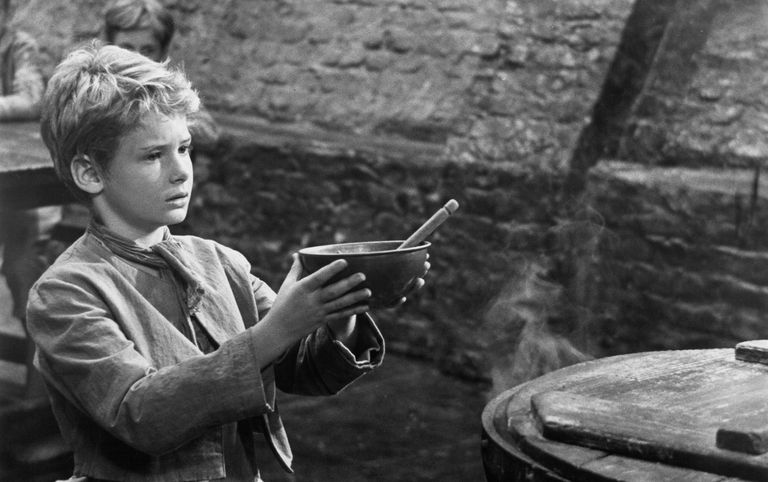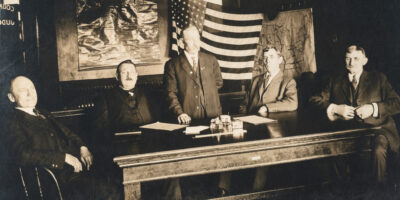The Secret History of the Monopolization of Welfare by the State
The fundamental political issue always confronting society is whether human relationships shall be based on free association and voluntary choice, or on governmental compulsion and command. Of course, in most societies there are elements of both, often called the interventionist state or the “mixed economy.” But, nonetheless, the basic institutional alternatives are liberty or coercion.
This often seems difficult for people to fully appreciate or understand. We select where we live, we accept or not accept a job offering, we decide on the furniture in our home and what (if anything) we will read in terms of books or magazines, or to watch on television. We pick our friends and choose the clubs and associations we want to join. A thousand other everyday choices and decisions reflect our freedom in still much of what we do.
Political Interference in Market Affairs
Yet, at the same time, we take for granted many aspects and facets of our lives where such decision-making is narrowed or co-opted for us by those in political authority. We are compelled to pay into the government pension system called Social Security; we are taxed to pay for types and degrees of medical and health care that we may or may not desire or consider worth what the government garnishes from our salaries to pay for it before we even see a penny of our earned incomes.
The government regulates how business is done, under what terms and conditions an employer may hire a worker, what products may be produced and with what qualities, features and characteristics, and sometimes the price at which the good or service may be sold.
These, too, are taken for granted and presumed to be the appropriate and necessary tasks of government in modern society. Indeed, in many if not most instances, the majority of Americans and the citizens of other countries, as well, don’t or rarely think twice about these roles for the political authority in our daily affairs. In fact, when they are challenged, a good number of people are shocked that it should be even questioned.
Yet, all these government activities inescapably reduce and restrict our free choices. Think of medical and health care. Increasingly government prevents people from deciding on the health insurance and medical treatment they may receive or purchase on their own. Practically all of the candidates vying for the Democratic Party presidential nomination have said they want to see implemented some form of a “single-payer” system, which, in reality, is socialized medicine under which government centrally plans all medical matters for everyone in society.
What Of Politically Mandated Euthanasia?

When friends of freedom raise serious questions about this, including government being handed control over life and death decisions for all of us, in terms of type and duration of medical treatment, they are often scoffed at. Yet, this danger has been warned about for more than a century. In 1916, in the midst of the First World War, a fairly well known British lawyer and classical liberal, E. S. P. Haynes (1877-1949), published a book called The Decline of Liberty in England. He explained how the British government had been encroaching on people’s personal, social and economic freedom in Great Britain for nearly 40 years, and the wartime emergency had merely exacerbated this trend. He wondered how much of all this could or might be reversed once the war was over.
Haynes reprinted as an appendix a brief article that had appeared in a magazine called, The Free Woman, shortly before the publication of his own book in 1916. The article was on, “Home Life in A.D 2000.” It tells the tale of an old and ill gentleman in the far off future year of 2000, who is waiting for the government to enforce mandatory euthanasia, since government planned and managed medical care dictate treatments and termination of life.
The gentleman says to his son in this imagined future:
“It really seems a pity that the Medical Control Board won’t let me live a little longer. Of course, there is a good deal of pain for one hour out of the twenty-four, which requires a certain amount of medical attention, but I should not mind paying a little extra for that if the State allowed any doctor or nurse to have a private practice. (However, I daresay I should never have been born under the new Inspection of Parents Act.) The point is that I am quite interested in the morning paper and talking to all of you and seeing a friend sometimes . . . and in old days I could have gone on indefinitely.”
The son comments that, yes, some are wistful for the “anarchy” of the old days, of around 1900, when people could make those decisions for themselves. But had not his father commented about how excited people were with the Voluntary Euthanasia Act of 1940? The elderly gentleman admits that that is so, “but, of course, it had to become compulsory soon . . .The expenses of the State medical service have been considerably reduced by the power of the Local Board to decide when a patient is not worth further attention.” He then asked his son, “By the way, did you see the official form? Did it give me a week or a fortnight,” before his mandatory termination?
His son read him the official government notice that had arrived:
“I regret to inform you that my Board have decided to allow you no further medical service after a week from this date, and they are of opinion that you would save yourself and your relations much inconvenience and pain by availing yourself of Section 3 subsection (1) of the Compulsory Euthanasia Act of 1980. Everything can be done at your house, if suitable preparations are made, as our Travelling Euthanasia expert will be in London at that date. You are probably aware that in cases like yours the Board will allow a grant of five pounds towards the cremation expenses, and will accept a preliminary Probate affidavit from yourself for the purpose of assessing death duties. For your guidance I enclose a special form which you must forward within three days to the Inland Revenue Department.”
The old gentlemen tells his son that there was a time when people would have considered such a compulsory ending to human life at the command of the State as against the very idea of a society of free individuals. However, such people who believed in liberty “were all ultimately secluded under the third Mental Deficiency Act,” that is, placed in mental institutions for those with the insane idea that freedom mattered.
How long ago, he reflects, was that bygone time when people, “swore, drank alcoholic preparations at meals, married without medical permission . . . Why, they actually owned houses and land in perpetuity, and read books which were excluded from the British Museum Catalogue, and wrote quite scurrilously about the Government. Those were indeed turbulent times. Everything was so casual and unforeseen.”
Finally, the gentleman thinks that he better make sure his will is in order before his mandatory termination, and he mentions to his son that as part of any eulogy, they might mention his important work on legislation relating to the “Better Regulation of Female Underclothing Act,” of which he is clearly very proud.
British National Health Care Can be an Indirect Euthanasia
In the first decades of the 20th century, this must have seemed all a fantasyland of “reactionaries” and “anti-social,” old fashioned laissez-faire liberal types. But, in fact, in the years before the First World War, the British government introduced the first legislative elements that eventually became the “single-payer” system under the inspiration of the welfare state already established in Imperial Germany, the very country with which Great Britain was then at war. Britain’s socialized healthcare system only was fully implemented following the Second World War under a socialist government.
Under the current British system, the government may not order your death after some point due to age or illness, but the stories are notorious concerning the wait times for seriously sick individuals to have access to doctor’s appointments or to the possible treatment that could cure them or at least noticeably prolong their lives. It is merely compulsory euthanasia through indirect means.
The Friendly Societies Provided Voluntary Social Safety Nets
Throughout the 19th century, a primary means for the provision of what today we call the “social safety nets” was by the private sector outside of government. The British Friendly Societies were mutual assistance associations that emerged to provide death benefits for the wives and children of the breadwinner who had passed away. But they soon offered a wide array of other mutual insurance services, including health care coverage, retirement pension programs, unemployment insurance, savings clubs to purchase a family house, and a variety of others.
A number of scholars who have devoted time to researching the lost history of the Friendly Societies estimate that by the end of the 19th century around two-thirds to three-quarters of the entire British population was covered by one or more of their programs and insurances. The research also discovered that a large majority of the subscribers were in the lower income brackets of the time; precisely because of their more modest financial circumstances, the “working poor” and the lower middle class were very conscious of the need to set aside a certain sum of their limited budgets to anticipate unexpected circumstances, as well as those situations that were inescapable for anyone, such as old age.
What stands out is that these were all private and voluntary associations and exchanges, in which the government paid little or no role. One part of this system of freedom was charity and philanthropy; that is, the voluntary giving by those better off to assist those who were financially worse off and deserved a helping hand.
The Generosity of Private Charity was Criticized!
How pervasive was such philanthropy and charity? William Stanley Jevons (1835-1882), one of the leading British economists of the second half of the 19th century, and one of the developers of marginal utility theory, called for the end to private charity and its replacement with a full government system. This was not due to the paucity of private benevolence, but rather due to what he considered its excessive generosity.
At a meeting of the British Association for the Advancement of Science in September 1870, Jevons criticize the open-handedness of the wealthy and better off in voluntarily helping the poor through various philanthropic endeavors. Private charity was creating a class of permanent poor, he said, which resulted in “the casual paupers [having] their London season and their country season, following the movements of those on whom they feed.”
The government programs for caring for the poor are “frustrated by the over-abundant charity of private persons, or religious societies.” He even was critical of the over-generosity of the private sector in the voluntary funding of hospitals for the poor and less fortunate. There were so many such charity hospitals, Jevons lamented, that these private medical establishments “compete with each other in offering the freest possible medical aid to all who come.”
Here was the heart of the problem. Rather than fear that private benevolence would not be enough to assist those unable to fully pay for food or medical treatment, there was too much of it! Jevons prayed, “that we are rapidly approaching the time when the whole of these pernicious charities will be swept away.” Instead, all such charitable matters needed to be shifted to “the supervision of the [government] Poor Law Board,” so bureaucrats could make wiser decisions concerning how much assistance and support the less well off should receive, rather than the uncontrolled generosity of individuals and private associations.
According to William Stanley Jevons, Great Britain needed more government responsibility for the poor and the unfortunate to bring a halt to the excessive voluntary giving of a free people. Central planning of charity was needed to replace the spontaneous giving of non-governmental civil society. Jevons wanted government imposed welfare austerity, if you will, in place of private philanthropic abundance. So much for the constant hue and cry by those on “the left” that if not for compulsory government welfarism, “the poor” would die in the streets!
Perverse Incentives of the British Poor Law Welfare System
Of course, Great Britain had had a form of the welfare state since the time of Queen Elizabeth I (1533-1603) in the 16th century. But the excessive waste of government redistribution and its perverse incentive effects had become clearly known by the 19th century, and became a point of criticism by the classical liberals of that period, and the basis of their case for reform in the private sector instead, in spite of the type of criticisms made by someone like Jevons.
For instance, one of the last of the important British classical economists, Henry Fawcett (1833-1884), explained the perverse consequences under the government system of social safety nets in his book, Pauperism: Its Causes and Remedies (1871). Investigations were made in the first half of the 19th century concerning the impact of the Poor Laws, under which taxed wealth was redistributed through the Church of England parishes.
Fawcett pointed out that illegitimacy was fostered under the government’s welfare state, that government redistribution became viewed as an “entitlement,” and that it created an attitude that taking the money of others through the State was as honest and acceptable as wages earned from a day’s work. Explained Fawcett:
“Men were virtually told that no amount of recklessness, self-indulgence, or improvidence would in the slightest degree affect their claim to be maintained at other people’s expense. If they married when they had no reasonable chance to being able to maintain a family, they were treated as if they had performed a meritorious act, for the more children they had the greater was the amount of relief obtained. All the most evident teachings of commonsense were completely set to naught . . .
“Population was also fostered by a still more immoral stimulus. A woman obtained from the parish a larger allowance for an illegitimate than for a legitimate child. From one end of the kingdom to the other people were in fact told not only to marry with utter recklessness and let others bear the consequences, but it was also said, especially to the women of the country, the greater is your immorality the greater will be your pecuniary reward. Can it excite surprise that from such a system we should have had handed down to us a vast inheritance of vice and poverty? . . .
“Pauperism often came to be regarded as a paying profession, which was followed by successive generations of the same family. Thus the Commissioners [of the Poor Laws] tell us of three generations of the same family simultaneously receiving relief . . . The feeling soon became general that pauperism was no disgrace, and that allowance which was obtained from the parish was just as much the rightful property of those who received it, as the wages of ordinary industry. Indolence was directly encouraged, and a spirit of lawlessness and discontent resulted.”
The Logic and Facts about Welfare Statism Cannot be Denied
Now, a liberal economist such as Henry Fawcett was not a proponent of strict laissez-faire in welfare matters, any more than he was in a number of other government policy issues. But logic and facts were what they are, and could not be wished away. If you pay people not to work, you have more people not working; if you do this long enough a system of intergenerational dependency emerges and recipients used to receiving such redistributed wealth start considering it a “right,” equal to a wage earned from employment in the marketplace.
Furthermore, if you reward people with larger welfare benefits for having more children including, especially, children out of wedlock, don’t be surprised if those women on welfare become less concerned about the more traditional notions of family responsibility in deciding how many children to have.
These were some of the consequences that classical liberals in 19th century Great Britain became concerned about, and wished to see alleviated and improved through the private sector alternatives to government compulsion through taxes for redistribution under the older Poor Law system.
Jevons’ Misplaced Concerns and Understandings about Welfare
In response to Jevons’ arguments, we all, no doubt, know parents who are excessively indulgent of their children’s wishes and wants. This sometimes creates an irresponsible attitude on the part of the child that they can and should have anything they want with no thought to the cost or the possibly negative impact on others. A few such children grow up thinking they can get away with murder.
But this is not generally the case in private households. Even with errors and mistakes along the way, most parents attempt to bring up their children with notions of responsibility and self-supporting habits for their later adult life. It would be absurd and dangerous for the State to declare that it will “plan” the upbringing of children within family households with schedules, detailed procedures, and surveillance of what is going on inside the family all day and night.
The same is true with private charity and philanthropy by individuals and voluntary associations. First, there is an ethical dimension not really touched upon by Jevons, and that is the morality of those who have honestly earned income and accumulated wealth being considered the rightful owners of it, and who should have the liberty to use and dispose of it as they think fit as a matter of individual right.
Second, Jevons seemed to be disturbed by the multitude of competing private charities serving the poor in the Great Britain of his time – and, by the way, this was before any notion of a charitable deduction on one’s income tax; it was guided simply by the idea that it was “the right thing to do.” What Jevons missed is that the charitable competition that he considered misplaced wasteful duplication is in fact the very avenue, like all other forms of peaceful rivalry, to discover the best and most efficient means and methods to reach an end or goal in mind.
And, third, it never seemed to enter Jevons’ mind that those who man and manage government welfare programs are not only as imperfect as the rest of us about how best to assist those in financial and other forms of need, but that those in political power in elected office and in the appointed bureaucracy have their own agendas and purposes that have nothing to do with the stated goals of any government program implemented.
The self-interests of those administering the government welfare system of that time resisted all change into a less compulsory paternalistic direction. A leading liberal reformer of the 1830s, Thomas Chalmers, pointed out the resistance to any reduction to government redistributive actions by the administrators of the relevant programs. The proponent of voluntarism, he said, “comes into collision with the prejudices and partialities of those who at present have the right and power of management” of the then-existing Poor Law system.
That is why it always comes down to that fundamental issue of voluntary choice and free association, including for purposes of social benevolence as well as decision-making in the marketplace, versus, instead, politically imposed force through taxes and compulsory redistribution and regulation of human affairs.
The tragedy of contemporary politics in America and abroad is that the debates and decisions all concern in what forms and for what purposes compulsion in social and personal affairs will be imposed. Left out of today’s public discourse is the issue that guided classical liberals in the 19th century: should people be free or shall they be coerced to do what others consider to be “the right thing”?











